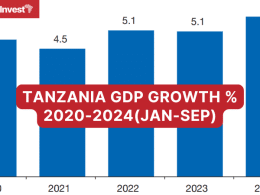TanzaniaInvest had the pleasure of interviewing Oscar Kissanga, the Executive Director of the Tanzania Chamber of Commerce, Industry, and Agriculture (TCCIA). Mr. Kissanga discusses key issues businesses face in Tanzania, the chamber’s initiatives to support local industries, and its strategies to promote trade and industrialization.
This interview is part of the recent partnership between TanzaniaInvest and TCCIA, aimed at fostering greater visibility for the chamber’s initiatives and enhancing collaboration.
As a pivotal institution in fostering trade, industry, and agriculture, TCCIA plays a vital role in addressing challenges, advocating for policies, and creating opportunities for businesses across Tanzania.
With this interview, readers will gain valuable insights into how TCCIA is shaping Tanzania’s economic landscape and driving growth in key sectors such as agriculture, industry, and trade.
Business Environment
What are the current challenges facing businesses in Tanzania, and how does TCCIA address them?
Regulatory Complexities: Businesses often face difficulties navigating the regulatory framework due to overlapping laws and time-consuming procedures. For example, acquiring permits and licenses can take weeks or even months, affecting the pace of operations, especially for new businesses.
“Businesses often face difficulties navigating the regulatory framework due to overlapping laws and time-consuming procedures.”
Access to Finance: Despite the presence of banks and microfinance institutions, many small and medium enterprises (SMEs) struggle to secure loans due to high interest rates and stringent collateral requirements.
Infrastructure Gaps: Inefficiencies in transportation, logistics, and energy supply increase costs and limit the competitiveness of businesses in both domestic and international markets.
What steps is TCCIA taking to improve the regulatory environment for businesses in Tanzania?
Policy Advocacy: TCCIA collaborates with the government through platforms like the Tanzania National Business Council to push for business-friendly reforms. This includes advocating for simplified tax regimes and digitizing regulatory processes.
“TCCIA collaborates with the government through platforms like the Tanzania National Business Council to push for business-friendly reforms.”
Business Education: Regular workshops, seminars, and training programs are organized to help members understand and comply with laws, regulations, and best practices.
Strategic Partnerships: Collaborations with organizations like TradeMark Africa aim to enhance access to markets and improve business efficiency through tailored projects such as capacity-building initiatives.
Support for Businesses and Advocacy
What initiatives are in place to support the growth and development of local businesses and industries?
Improving the Regulatory Environment: Engaging policymakers through government advisory councils such as Tax Dialogue Forums and TNBC Meetings ensures members’ concerns are represented. Recent efforts include advocating for amendments to customs regulations to facilitate smoother cross-border trade.
Digitization Initiatives: Encouraging the adoption of electronic platforms for tax compliance and business registration reduces bottlenecks and minimizes human error, expediting service delivery. This is explicitly supported by the MoU recently signed with TRA.
Growth and Development Initiatives: Trade fairs and networking events, such as the Tanzanite Manyara Trade Fair, provide businesses with platforms to showcase their products, interact with potential clients, and build partnerships. TCCIA also helps businesses navigate international standards, such as AfCFTA Certificates of Origin and leverages digital marketing and e-commerce tools to empower members.
“TCCIA also helps businesses navigate international standards, such as AfCFTA Certificates of Origin and leverages digital marketing and e-commerce tools to empower members.”
How does TCCIA collaborate with the government to influence policies that benefit the business community?
Policy Advocacy: TCCIA continuously engages with the government on policies that affect the private sector. For example, the chamber has lobbied for tax holidays and export incentives for new businesses venturing into industrial production.
“The chamber has lobbied for tax holidays and export incentives for new businesses venturing into industrial production.”
Public-Private Initiatives: Joint programs with government bodies, such as the Ministry of Industry and Trade, aim to streamline bureaucratic processes and improve service delivery.
Agriculture
What are TCCIA’s plans to boost agricultural productivity and market access?
Capacity Building for Farmers: Through training programs, TCCIA equips farmers with modern agricultural practices, including irrigation techniques, crop diversification, and value addition. These efforts directly enhance productivity and profitability.
“Through training programs, TCCIA equips farmers with modern agricultural practices, including irrigation techniques, crop diversification, and value addition.”
Export Facilitation: TCCIA supports farmers and agro-processors in obtaining necessary certifications, like the electronic Certificate of Origin, to meet export requirements. This has opened up new opportunities in markets like Europe and Asia.
Strategic Collaborations: Partnerships with organizations like TRIAS provide funding and technical assistance to enhance the agricultural sector.
Industry
What strategies does TCCIA have to promote industrialization and increase value-added production in Tanzania?
Value Addition: TCCIA encourages businesses to move beyond raw material exports by investing in processing industries. For example, promoting the processing of agricultural produce like coffee, cashew nuts, and tea ensures better returns and creates jobs.
“TCCIA encourages businesses to move beyond raw material exports by investing in processing industries.”
Investment in Skills Development: Recognizing the skills gap in industrial labor, TCCIA collaborates with vocational training institutions to provide hands-on training in manufacturing, maintenance, and engineering.
Cluster Approach: The chamber promotes the development of industrial clusters, where businesses within the same sector share resources such as infrastructure, raw materials, and technology to improve efficiency and reduce costs.
Trade
How is TCCIA assisting its members in taking advantage of various trade blocks of which Tanzania is a member?
AfCFTA Participation: With the African Continental Free Trade Area (AfCFTA) offering access to over 1.3 billion people, TCCIA focuses on educating businesses about rules of origin, tariff-free benefits, and market opportunities within the bloc.
Regional Integration: TCCIA helps members navigate trade agreements within the East African Community (EAC) and the Southern African Development Community (SADC). This includes lobbying for harmonized tariffs and reducing non-tariff barriers to facilitate smoother cross-border trade.
“TCCIA helps members navigate trade agreements within the East African Community (EAC), the Southern African Development Community (SADC), and the African Continental Free Trade Area (AfCFTA).”
Data-Driven Insights: Through market research and trade data analysis, TCCIA provides members with actionable insights to identify and capitalize on emerging opportunities in both regional and global markets.
Future Outlook
Where do you see the biggest opportunities for economic growth and investments in Tanzania over the next few years?
Economic Growth and Investment Opportunities: High-growth sectors such as agriculture, renewable energy, and manufacturing remain key drivers of Tanzania’s economic growth. TCCIA’s strategic focus aligns with the national vision of becoming a middle-income economy by 2030.
“High-growth sectors such as agriculture, renewable energy, and manufacturing remain key drivers of Tanzania’s economic growth.”
Digital Transformation: Leveraging technology in areas like fintech, e-commerce, and logistics is expected to spur growth by increasing efficiency and reducing costs for businesses.
Infrastructure Development: Large-scale projects, such as the Standard Gauge Railway (SGR), port expansions, and energy generation initiatives, are set to improve logistics and attract foreign investments.
Youth and Women Entrepreneurship: TCCIA plans to increase programs aimed at nurturing youth entrepreneurship by providing mentorship, training, and financial resources, ensuring a sustainable and dynamic economy.










